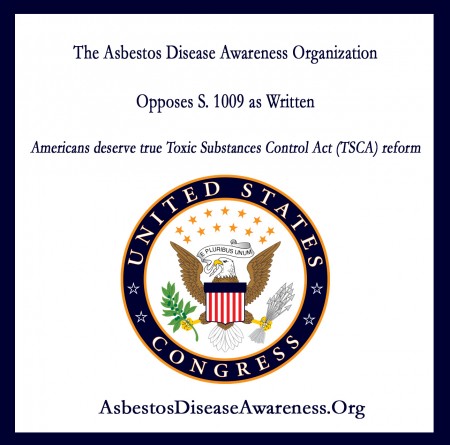Posted on July 18, 2013
 The Asbestos Disease Awareness Organization (ADAO), the largest independent non-profit organization in the U.S. dedicated to eliminating asbestos disease, cannot support the “Chemical Safety Improvement Act of 2013” (S. 1009), referred to as “CSIA”, without significant improvements to protect the public from dangerous chemicals, such as asbestos.
The Asbestos Disease Awareness Organization (ADAO), the largest independent non-profit organization in the U.S. dedicated to eliminating asbestos disease, cannot support the “Chemical Safety Improvement Act of 2013” (S. 1009), referred to as “CSIA”, without significant improvements to protect the public from dangerous chemicals, such as asbestos.
At the present time, the only two ways to eliminate environmental and occupational asbestos-caused diseases are prevention and a cure. While we are encouraged by bipartisan efforts to overhaul the outdated and ineffective Toxic Substances Control Act (TSCA) from 1976, S. 1009 fails to support prevention. Not only do the same hurdles that prevented the EPA from banning asbestos in 1989 remain in S. 1009, the bill would also prevent states from taking steps to complement federal efforts and protect their constituents from toxic chemicals, such as asbestos.
In April 2013, ADAO applauded congressional efforts on the “Safe Chemicals Act of 2013” (S. 696), which would adequately protect American families from toxic exposures. However, since then, CSIA, the Chemical Safety Improvement Act of 2013 (S. 1009), was introduced in May. While the chemical industry is pleased with this new bill, ADAO and the majority of other environmental and public health organizations do not support the current language. Specifically, CSIA has the following critical flaws:
- Next to Impossible to Phase Out or Ban Harmful Chemicals. CSIA would make it impossible for EPA (the Environmental Protection Agency) to ban or phase out the worst of the worst toxic chemicals on the market.
- Grossly Inadequate Safety Standard. CSIA’s safety standard would place a heavy burden on EPA to find that a chemical such as asbestos is unsafe, rather than shifting the burden to chemical companies to show chemicals are safe.
- Lack of Deadlines to Ensure Safety. CSIA is virtually devoid of any deadlines that would require EPA to act quickly to assess and restrict the use of harmful chemicals such as asbestos.
- Unworkable Standard of Court Review. CSIA would retain the unworkable standard of court review found in TSCA, which ultimately prevented EPA from being able to ban asbestos in 1989.
- Freeze on State Efforts to Protect People from Chemicals. CSIA contains far-reaching language that would paralyze states from being able to enforce existing laws or pass new ones, to increase protections against harmful chemicals such as asbestos.
Today, ADAO sent a letter and position paper voicing our concerns to every U.S. Senator. The position paper was also distributed last week to Senate health and environment staffers during ADAO’s Senate staff briefing in Washington, D.C. Additionally, this month, ADAO launched a petition to U.S. Congress to ban asbestos and save lives. Over 2,000 individuals around the world have already signed and we hope to reach 10,000 by the end of the month.
Congress must stand up to the chemical industry on behalf of asbestos victims and pass a bill that would do more to protect the American people from exposure to harmful chemicals. The problems discussed above represent just a handful of the ways that CSIA would fail to deliver meaningful reform. Consequently, the Asbestos Disease Awareness Organization, the largest U.S. independent asbestos victims’ organization, cannot support the bill as written.
In unity,
Linda
